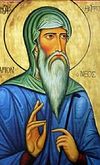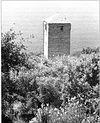

| Previous day | Next day |
| Old Style
February 14
|
Wednesday |
New Style
February 27
|
|
Tone 6.
Fast Day. |
Fish, wine and oil allowed.
|
![]() St. Auxentius, monk, of Bithynia (ca. 470).
St. Auxentius, monk, of Bithynia (ca. 470). ![]() St. Cyril, Equal-to-the-Apostles, teacher of the Slavs (869).
St. Cyril, Equal-to-the-Apostles, teacher of the Slavs (869).
St. Maron, hermit of Cyrrhus (ca. 433). St. Abraham, bishop of Charres in Mesopotamia (5th c.). St. Isaac, recluse of the Kiev Caves (ca. 1090). Translation of the relics of Martyrs Prince Michael and his counselor Theodore, of Chernigov (1578). St. Hilarion the Georgian (the New) of Imereti and Mt. Athos (1864).
New Hieromartyr Onesimus (Pylaev), bishop of Tula (1937).
St. Peter, patriarch of Alexandria (380). Hieromartyr Philemon, bishop of Gaza. New Martyr Nicholas of Corinth (1554). New Monk-martyr Damian of Philotheou and Kissavos, at Larissa (1568). New Martyr George the Tailor, of Mytilene, at Constantinople (1693). St. Raphael, bishop of Brooklyn (1915).
Repose of Archimandrite Barsanuphius of Valaam and Morocco (1952), Righteous Barbara (Arkhangelskaya) the Recluse, of Ufa (1966), and Elder Ephraim of Katounakia (1998).
Thoughts for Each Day of the Year
According to the Daily Church Readings from the Word of God
By St. Theophan the Recluse

Wednesday. [I John 3:21–4:6; Mark 14:43–15:1]
If help is needed, ask. “I asked,” you say, “and it was not given.” But then how is it given to others? With the Lord there is no respect of persons; to give to one, and not to give to another without any reason. He is ready to give to all—for He loves to be giving. If He does not give to someone, the reason is not in Him, but in the one asking help. Among such reasons can be some that we cannot even guess. But there exist known reasons, visible to anyone. One of these reasons (and is it not the chief reason?) Saint John points out to be the absence of confidence, and the absence of confidence comes from the condemnation of the heart or the conscience. Beloved, he says, if our heart condemn us not, then have we confidence toward God. And whatsoever we ask, we receive of Him, because we keep His commandments, and do those things that are pleasing in His sight (I John 3:21). There is nothing more to add to these words. Everything is clear in and of itself. What master will help an unfaithful servant, a squanderer and profligate? Will the Lord really indulge us when we do not want to please Him and fulfil His commandments; if we only start praying when an extreme need arises?!
Articles
 Venerable Isaac the Recluse of the Kiev Near CavesSaint Isaac was the first person in northern lands to live as a fool for Christ. |








